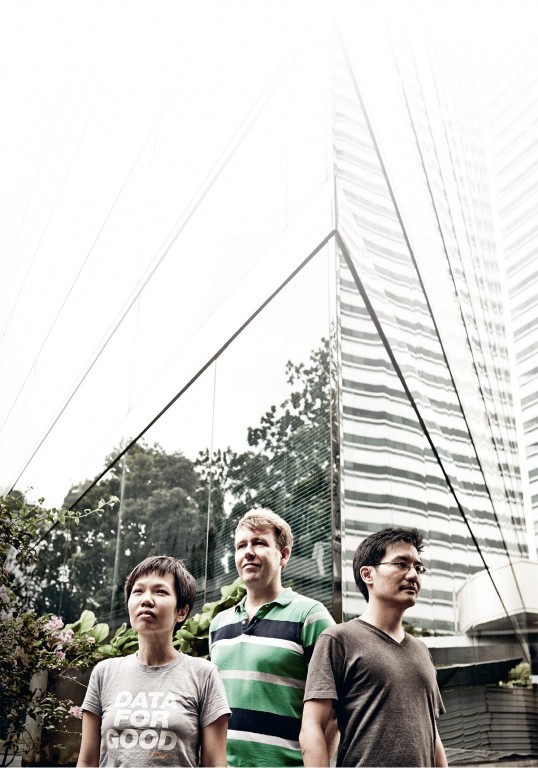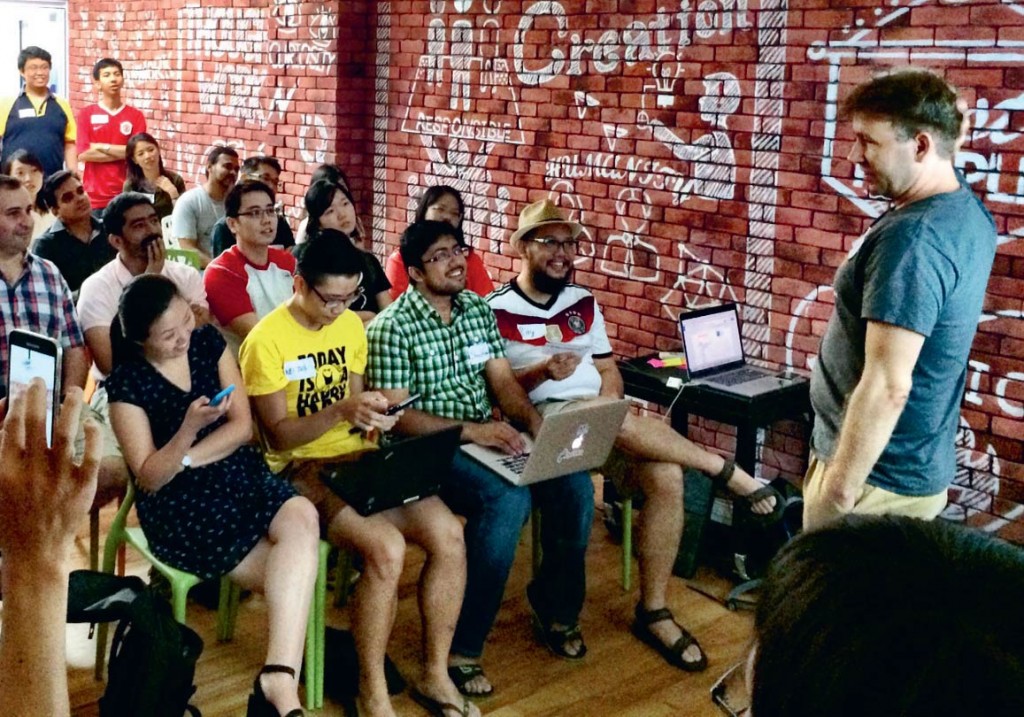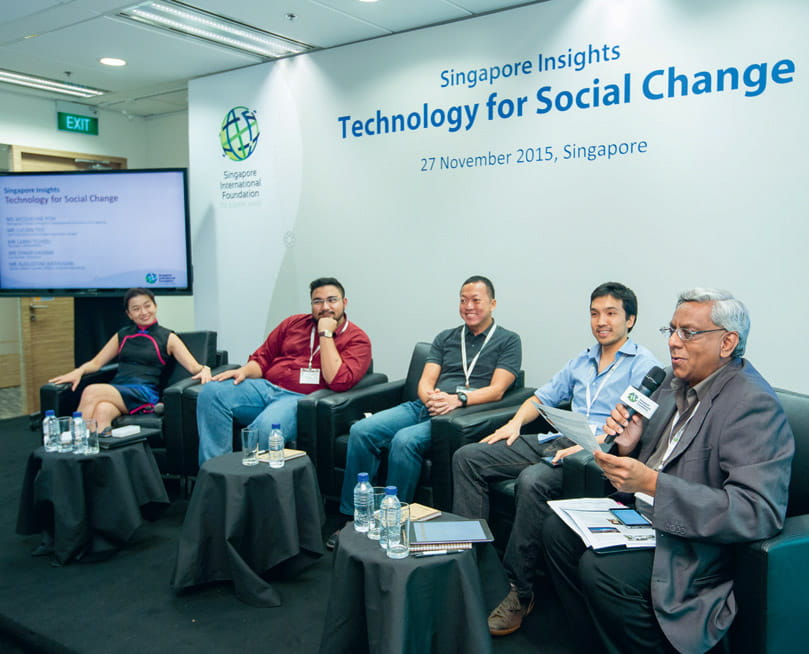Stories > Technology for Good
Technology for Good

DataKind Singaporeʼs chapter leaders Singaporean Lee Pui Kwan, Dutch national Erik van Helvoort and Canadian Oliver Chen.
The Singapore chapter of non-profit organisation DataKind is made up of a multicultural group of data scientists working together to hack data for greater social good.
BY AUDRINA GAN
PHOTOS JUSTIN LOH, DATAKIND SINGAPORE, SINGAPORE INTERNATIONAL FOUNDATION
ur growing reliance on technology has resulted in an abundance of data that can be mined to gain new insights into our world and help to transform almost any industry. To tap this potential for good, American data scientist Jake Porway established non-profit organisation (NPO) DataKind in New York in 2011 to connect well-meaning data scientists with budget-strapped NPOs to carry out pro-bono data analysis work.
DataKind runs various programmes in which data scientists help NPOs from multiple sectors, including health care and the environment, extract critical information from the vast amounts of data they own to increase the effectiveness of their initiatives or improve their operational efficiency.
Its programmes proved to be a hit with data scientists and NPOs alike. In April 2013, it started its first overseas chapter, in London. In early 2014, it put out a call to set up similar communities in other cities.
WHO’S BEHIND DATAKIND SINGAPORE?
DataKind Singapore was launched in August 2014 to bring together data scientists and NPOs to tackle challenges in Singapore and the region. The Singapore chapter was founded by Singaporeans Lee Pui Kwan and Thia Kai Xin, Canadian Oliver Chen and British-Canadian Daryl Manning. However, Manning and Thia later stepped down as chapter leaders due to work commitments, and Dutch national Erik van Helvoort came on board. All work for DataKind Singapore on a voluntary basis.
“I believe in the work that DataKind is doing; I hope it can expand its influence globally to help more communities and move closer to harnessing the power of data science in the service of humanity.”
Lee Pui Kwan, DataKind Singapore, chapter leader
Chen, who runs his own consulting firm, says of their motivations: “In our day job, we are occupied with trying to help our company or client make more money through our work. So I want to do something that has a greater purpose to benefit a bigger group.”
Lee, a programme manager at Expedia, is in charge of volunteer and project management as well as budget and roadmap planning at DataKind Singapore while van Helvoort, who runs a software company co-founded with two friends, is involved in meeting potential partner organisations that wish to collaborate with DataKind Singapore.
The chapter leaders are supported by a group of core volunteer leaders, comprising a German, two Indians and two Singaporeans. Says Lee: “We have become close friends with a common data-for-good goal.”
HOW DOES IT FUNCTION?
DataKind Singapore organises two main events to help volunteer data scientists and partner organisations develop a better framework for and insight into the type of work that needs to be done.
The first, known as Project Accelerator, is an evening brainstorming session that brings together data science volunteers to provide quick advice and consultation for NPOs. At the end of the evening, each group shares the result of its discussions with the session participants. The NPOs are then able to apply what they have learnt to their respective organisations.

ABOVE: Volunteers at a DataKind Singapore evening brainstorming session known as Project Accelerator.
DataKind Singapore hopes to take on projects for bigger organisations and with bigger social impact. It aims to look beyond Singapore to support causes that affect communities in the region.
The other event, known as DataDive, is a weekend session to help NPOs advance their cause. At the end of the session, the teams come together to present the insights they have gained or even the prototypes of advocacy tools they have built. It is up to the NPOs how they want to apply what they learnt from these sessions. Ultimately, they leave with a better understanding of how data science can help in their work.
WHO ARE THE VOLUNTEERS?
DataKind Singapore has helped to bring different people together with the common goal of doing good. It taps on a growing, multicultural network of more than 1,100 volunteers, comprising data scientists, data analysts and programmers. Of these, about 200 attend its events, held once every two months. Chen says: “Whenever we issue a call for action for people to volunteer their time, we’re always oversubscribed. The appeal we have for Singaporeans is that we provide an outlet for them to contribute not just their time, but also their skills.”
One of its volunteers is Jennifer Ahrens, who is from Germany but works in Singapore as a demand analyst for a mining company. Ahrens helps to plan and run various projects and events at DataKind Singapore, and is also the project manager for the group’s engagement with Riverkids Project, a Cambodian NPO working with vulnerable children in Phnom Penh. She says: “Some people have never written a line of code in their life; others are highly experienced data scientists. Nonetheless, it is always a collaborative atmosphere and everyone can contribute something based on their own skills and background.”
FUTURE PLANS
Chen says DataKind Singapore hopes to take on projects for bigger organisations and with bigger social impact. It aims to look beyond Singapore to support causes that affect communities in the region. He says: “One of the biggest issues in South-east Asia is human trafficking, and we hope to do more of such work. We also hope to increase our expertise in artificial intelligence and data analytics.”
EXAMPLES OF IMPACT
Earth Hour
DataKind Singapore helped Earth Hour, an NPO with a focus on environmental issues, to identify the strengths of its online campaign as well as areas for improvement in mobilising its online community.
“DataKind delivered detailed analysis that helped us to understand what our supporters cared about, where they were located and how we could better engage them to join our efforts to take action against climate change,” says Sid Das, executive director of Earth Hour Global.
Riverkids Project
DataKind worked with Riverkids Project, an NPO that helps families and children affected by child trafficking and abuse in Phnom Penh, Cambodia, to develop a case management system to keep track of its benefi ciaries and improve its data collection methods.
“They helped us to identify the specifi c technical challenge of replacing our ageing database software and how to make good use of the data we collected from the families we were helping,” says Dale Edmonds, managing director of Riverkids Project.
TECHNOLOGY FOR SOCIAL CHANGE
Since last year, Singaporeʼs quest to become the worldʼs fi rst Smart Nation – where technology is harnessed to improve peopleʼs lives, create more opportunities and build stronger communities – has gathered pace.
In line with this vision, on Nov 27 last year, the Singapore International Foundation (SIF) gathered a diverse panel of social entrepreneurs, policymakers and practitioners for Singapore Insights – a series of conversations and study visits that bring Singapore and the international community together to spark ideas for positive change.
Themed “Technology for Social Change”, this 17th edition saw more than 50 SIF alumni, partners and friends join a fourmember panel to exchange ideas on how to leverage technology to bring about social change, as well as how Singapore can work with regional communities to build a better world.
The panel comprised Jacqueline Poh who, in her role as managing director of the Infocomm Development Authority of Singapore, is involved in Singaporeʼs Smart Nation initiative; Lucian Teo, a user education and outreach specialist at Google; Larry Tchiou, founder of social enterprise Unframed, an incubator for technological initiatives with social impact; and Syakir Hashim, co-founder of social enterprise Skolafund, a digital platform that crowdfunds scholarships for underprivileged students.
A key concern raised during the session was that technology would result in the loss of essential human interactions when used for social change. Panellists, however, stressed the continued importance of human interaction in the social sector and presented technology as merely a tool to facilitate the work of those in the sector.
Tchiou said that the biggest challenge lies in changing the mindset of those in the social sector who employ technology to replace humans rather than as a tool to enhance relationships. Stressing the importance of cultural sensitivity, Syakir said: “(Before) we can start thinking about making contributions through technology, we need to expose our youth to surrounding countries to understand the various cultures, languages and norms.”
Participants also discussed Singaporeʼs role as a force for good in the region, highlighting the presence of an ecosystem in the country, which supports collaboration across multiple public and private sectors.
Tchiou said: “(Through an) ecosystem... looking into creating more technology-based innovation, we can positively impact communities.”

Panellists for SIFʼs 17th edition of Singapore Insights include (from left) Jacqueline Poh, Syakir Hashim, Lucian Teo and Larry Tchiou. The session was moderated by Channel NewsAsiaʼs senior editor Augustine Anthuvan.
